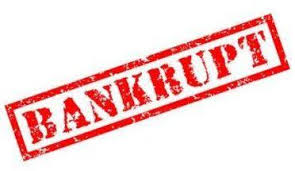bankrupt
英 [ˈbæŋ.krʌpt]
美 [ˈbæŋ.krʌpt]
- adj. 破产的
- vt. 使破产
- n. [经] 破产者
使用频率:

记忆方法
将“bankrupt”分解为“bank”和“rupt”,在脑海中联想一个银行(bank)因为经营不善,突然“rupt”(破裂、崩溃)而破产。这种联想有助于记忆该单词的意思。
以上内容由AI生成, 仅供参考和借鉴
中文词源
bankrupt 破产
bank, 凳子。词根rupt, 破,见corrupt. 来自14世纪时威尼斯货币商人如破产则砸碎凳子。
英语词源
- bankrupt (adj.)
- 1560s, from Italian banca rotta, literally "a broken bench," from banca "moneylender's shop," literally "bench" (see bank (n.1)) + rotta "broken, defeated, interrupted" from (and remodeled on) Latin rupta, fem. past participle of rumpere "to break" (see rupture (n.)). "[S]o called from the habit of breaking the bench of bankrupts" [Klein]. Earlier in English as a noun, "bankrupt person" (1530s).
- bankrupt (v.)
- 1550s, from bankrupt (adj.). Related: Bankrupted; bankrupting.
权威例句
- 1. It was touch and go whether we'd go bankrupt.
- 我们是否会破产还很难说。
- 2. He was declared bankrupt after failing to pay a £114m loan guarantee.
- 由于无力偿还1.14亿英镑的贷款担保,他被宣布破产。
- 3. The company was adjudged bankrupt.
- 该公司被宣判破产。
- 4. They went bankrupt in 1993.
- 他们于1993年破产。
- 5. He seemed to be bankrupt of hope and confidence.
- 他似乎毫无希望和信心.
